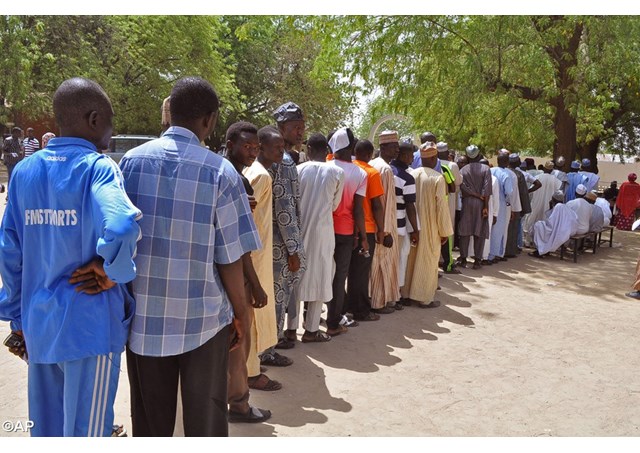
Cardinal Onaiyekan on Nigeria elections: “So far, so good.”

(Vatican Radio) Nigerians have turned out in their millions this Saturday to vote in a presidential election that analysts say is too close to call between President Goodluck Jonathan and former military dictator Muhammadu Buhari. It is the first election in Nigeria's history where an opposition candidate has a realistic chance of defeating a sitting president.
Technical difficulties
Owing to widespread frustration at technical difficulties with new biometric card-reading machines intended to prevent election fraud, Nigeria's electoral commission has said it would extend voting into an extra day in polling stations that had experience issues.
Voters not always safe from terrorists
The voting however has been disrupted by terrorist attacks with Boko Haram killing fourteen voters including an opposition politician with at least six voters shot dead in three separate assaults on polling stations in the country’s north east. While in the capital military helicopters were used to hover and observe the lines of voters. The election had been originally scheduled for the 14th February, however were delayed because of security threats in the north east. Boko Haram rejects democracy as un-Islamic and has threatened to kill any Nigerian who casts a ballot. The military in a response to the criticism leveled at them by the President Goodluck Jonathan has increased its presence in order to ensure public safety. In order to cater for the estimated 1.5 million refugees displaced by Boko Haram, special polling stations were set up in refugee camps.
Click her to listen to this report by Junno Arocho's:
Earlier Saturday, President Jonathan ran into some problems when his accreditation didn’t go through and was delayed for roughly 20 minutes. Despite some technical setbacks and the threat of past violence looming in many people’s minds, lines continue to form at polling stations in what is considered to be one of the most hotly contested elections since Nigeria gained independence.
Among those who are hopeful is Cardinal John Onaiyekan, the Archbishop of Abuja. Speaking today with Vatican Radio, Cardinal Onaiyekan said that the elections are “so far, so good.”
“Nigerians, as usual, have come out in big numbers with patience, not only to carry out their civic duty of voting but also to take advantage of their right to choose their leaders,” he said.
Regarding President Jonathan’s delay in voting, the African prelate said that the incident only served to highlight “the fact that technology has its limits.”
Some fear a repeat of violence after the 2011 elections which resulted in the deaths of an estimated 1,000 people. Although Jonathan and Buhari have signed a peace pledge, promising to accept the results of a free and fair election, some have been killed in pre-election violence that highlights the divisions that exist.
However, Cardinal Onaiyekan says that Nigerians are aware of the importance of this election and are committed to peace in the country.
“The possibility of violence is there but one thing is clear, for the past 3-4 months, everybody in Nigeria has been stressing that the fact that we need to do what we can to avoid this utter chaos and violence,” the Cardinal said.
Though divisions exist, particularly in light of the constant threat posed by Boko Haram militants in the country, Cardinal Onaiyekan is hopeful, saying that he is convinced that Nigeria “can manage to avoid the worst.”
| All the contents on this site are copyrighted ©. |


